#star trek has always been political
Text
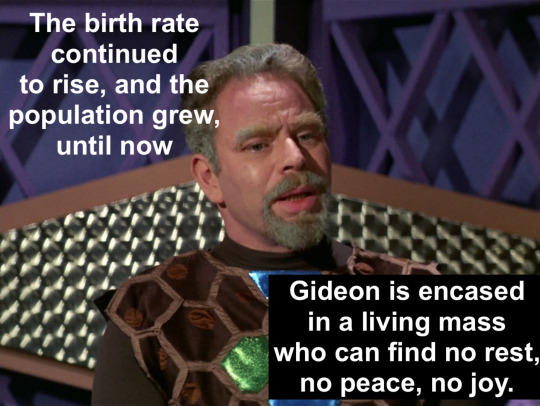
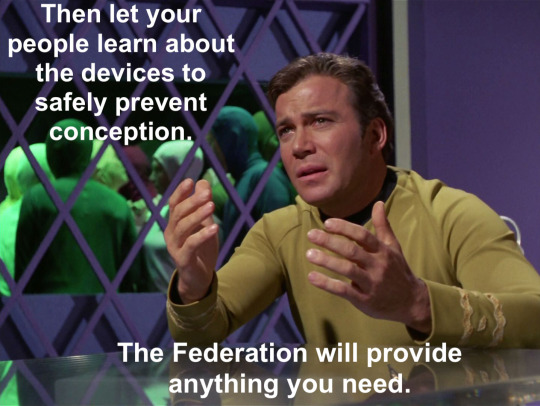
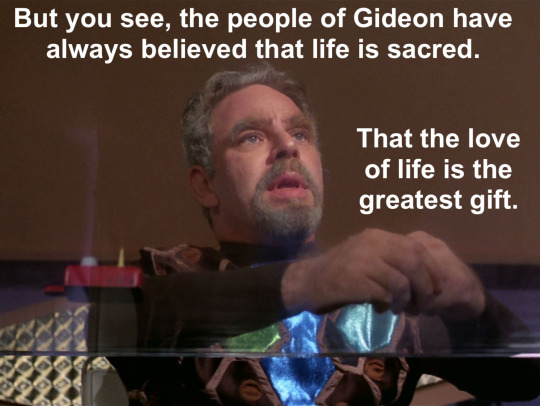

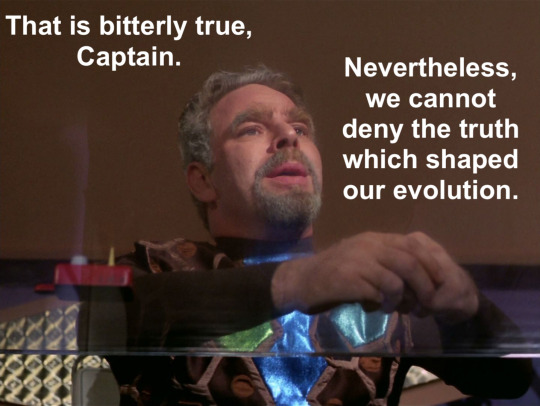
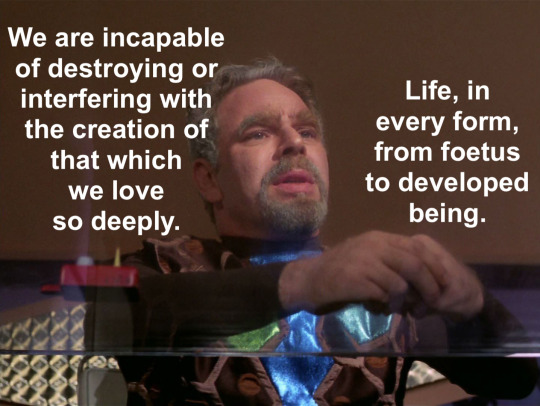
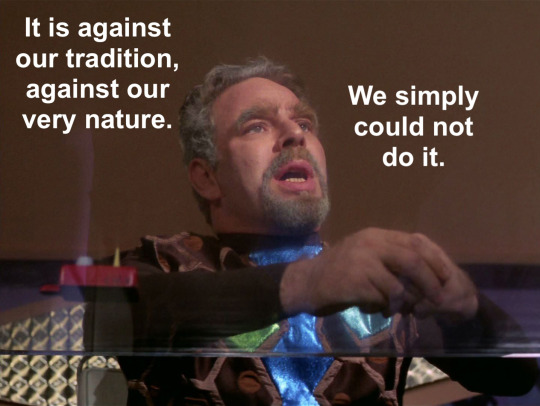
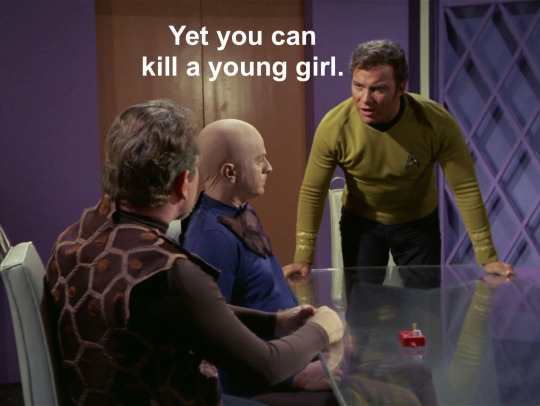
Star Trek, "The Mark of Gideon."
Airdate: January 17, 1969.
Sigh.
#star trek#star trek tos#jim kirk#the mark of gideon#hodin#captain kirk#image source: trekcore#transcript source: chakoteya#i can't believe the us is going fucking backwards on this#i'm okay in canada but as a us citizen it's killing me#star trek has always been political#between the episode about antimaskers and this one the third season should not be this goddamn painfully relevant#anyone who wants to clown on this post: just don't#you will be instantly blocked
9K notes
·
View notes
Text
right so I'll preface this with a blanket statement that I am not steeped in the star trek fandom, this might be an old well-trod topic or it might be reigniting an argument that people have sworn never to talk of again in either case I'm sorry
so right… star trek economics question:
if we accept that according to Star trek: first contact - the federation does not use money,
what controls access to limited resources such as chateau du Picard wine, or other such luxury non-replicated things? like is there a lottery, first come first served, is it only available to the producers and those that they know and like, is there a black market for such luxuries using barter or some other unregistered medium of exchange, is Picard's wine production a way of producing better replicator patterns, some of or all of the above (depending on which limited resources we're talking about )?
#Star Trek#Star Trek Economics#like for all the federations post-scarcity no money it's interaction with material culture is often fundimentally neoliberal#and like I know that's because TNG and DS9 were produced in the 90s#and star trek has always been a tool for discussing and exploring contemporary politics#and like i know at least part of the answer is inconsistent writing and world building but can we please have a better answer than that!
11 notes
·
View notes
Note
Hi, genuine good faith question if you'd like! How is TOS racist? It was my understanding that the OG Series was like, huge for equality in media?
I’m speaking primarily about the content of TOS itself, not its historical impact - I understand it had various historic firsts in terms of having characters of colour in respectable roles, which I’m not dismissing. My experience with the discourse on here surrounding the show is that people front-load these character representations as emblematic of the show’s progressive politics. Which, if we want to go that route, TOS was contemporary to the US civil rights movement, which provides us with a handy measuring stick to see how TOS actually grapples with race, not just the presence of characters of colour themselves. I'm going to be kind of defensive in this explanation, not towards you specifically, but because I have had this conversation with people online many, many, many times, and so any defensiveness on my part is in anticipation of arguments I know will come up as a result of making the basic claim that a show made in America in the 1960s is racist. I'm also going to be copy + pasting from an older post I've made on the subject since it's been a while now since I've watched TOS so some of the details are fuzzy.
Like okay, the premise of TOS is that the Enterprise, as an ambassador of Starfleet/the Federation, is seeking out new alien life to study. The Prime Directive prohibits the Enterprise crew from interfering with the development of any alien culture or people while they do this, so the research they collect needs to be done in an unobtrusive way. I think this is the first point at which people balk at the argument that TOS is racist or has a colonial conception of the world - the Enterprise’s mission is premised on non-interference, and I think when people hear ‘colonial’ as a descriptor they (understandably, obviously) assume it is describing active conquest, genocide, and dispossession. Even setting aside all the times where Kirk does directly interfere with the “development” of a people or culture (usually because they’ve “stagnated” culturally, because a culture "without conflict" cannot evolve or “develop” beyond its current presumed capacity - he is pretty explicitly imposing his own values onto another culture in order to force them to change in a particular way), or the times when the Enterprise is actually looking to extract resources from a given planet or people, I’m not exactly making this claim, or rather, that’s not the only thing I’m describing when calling TOS racist/colonial.
The show's presentation of scientific discovery and inquiry is anthropological - the “object” of analysis is alien/foreign culture, meaning that when the Enterprise crew comes into contact with a new being or person, this person is always read first and foremost through the level of (the Enterprise’s understanding of) culture. Their behaviour, beliefs, dress, way of speaking, appearance, and so on are always reflective of their culture as a whole, and more importantly, that their racial or phenotypic characteristics define the boundaries of their culture. Put another way, culture is interpreted, navigated, and bound racially - the show presents aliens as a Species, but these species are racially homogeneous, flattening race to a natural, biological difference that is always physically apparent and presented through the lens of scientific objectivity, as "species" is a unit of biological taxonomy. Basically species is a shorthand for race. This is the standard of most sci-fi/fantasy genre work, so this is not a sin unique to Star Trek.
Because of this however, Kirk and Co are never really interacting with individuals, they are interacting with components of a (foreign, exotic, fundamentally different) culture, the same way we understand that a biologist can generalize about a species using the example of an individual 'specimen'. And when the Enterprise interacts with these cultures, they very frequently measure them using a universalized scale of development - they have a teleological (which is to say, evolutionary) view of culture, ie, that all cultures go from savage to rational, primitive to advanced, economically simple to economically complex (ie, to capitalist modes of production). And the metrics they are judging these cultures by are fundamentally Western ones, always emphasising to the audience that the final destination of all cultures (that are worthy of advancing beyond their current limited/“primitive” stages) is a culture identical to the Federation, a culture that can itself engage in this anthropological mission to catalogue all life as fitting within a universal set of practices and racial similarities they call “culture.”
This is a western, colonial understanding of culture - racially and spatially homogeneous people comprise the organs of a social totality, ie, a society, which can then be analysed as an “object,” as a “phenomenon,” by the scientists in order to extract information from them to produce and advance state (ie Federation) knowledge. The Enterprise crew are allowed to be individuals, are allowed to be subjects with a capacity for reason, contradiction, emotion, compassion, and even moments of savagery or violence, without those things being assigned to their “race” or “culture” as a whole, but the people they interact with are only components of a whole which are “discovered” by the Enterprise as opportunities to expand and refine the Federation’s body of knowledge.
Spock is actually a good example of what I'm talking about, because he is an exception to this rule - unlike the others in the crew, his behaviour is always read as a symptom of his innate Vulcan-ness, where his human and Vulcan halves war for dominance in his mind and character. Bones (the doctor, one of the main cast) constantly comments on Spock's inability to feel things, that he is callous and unsympathetic, ruled by Vulcan logic to such an extreme that his rationality is a form of irrationality, as his Vulcan blood prohibits him from tempering logic with human emotion and intuition. Now you can argue that Bones is a stand-in for the racists of the world, that Spock proves Bones wrong in that he is able to feel but merely keeps it under wraps, that Vulcans are not biologically incapable of emotion but merely live in a socially repressive culture, but this still engages in the racial logic of the show - Vulcans are a racially-bound species with a single monolithic culture, and Spock's ability to express and feel 'human emotions' is the metric by which he is granted human subjectivity and sympathy.
And on the flip side you have the Klingons - a “race” that is uniformly savage, backward, violent, and dangerous. In the episode Day of the Dove, where Klingons board the Enterprise along with an alien cloud that makes everyone suddenly aggressive and racist (this show is insane lol), the Enterprise crew begins acting violent and racist, but the Klingons don’t change. They aren’t more violent than before (because they already were fundamentally violent and racist), and they don’t become less violent when the cloud eventually leaves (because they are never able to emerge from their violence and savagery as a social condition or external imposition - they simply are that way). Klingons are racially, behaviourally, psychologically, and culturally homogeneous, universally violent and immune to reason, and their racial characteristics are both physical manifestations of this universal violence as well as the origin of it. The writers and creators of TOS are explicitly invoking the orientalist idea of the “Mongolian horde,” representing both the American fear of Soviet global takeover as well as blatantly racist fears about “Asiatics” (a word used in the show, particularly in The Omega Glory where a fear of racialised communist takeover is made explicit) dominating the world.
This is colonial thinking! Like, fundamentally, at its core, this is colonial white supremacist thinking. Now this is not because TOS invents these tropes or is the origin of them, it is not individually responsible for these racial and colonial logics - these conceptions are endemic to Western thought, and I am not expecting a television show to navigate its way outside of this current colonial paradigm of scientific knowledge. I’m also not expecting an average person watching this to pick out all the intricacies of this and link it to the colonial history of Europe or the colonial history of western philosophy/thought. But this base premise of Star Trek is why the show is fundamentally colonial - even if it was the case that the crew never intervened in any alien conflict, never extracted any material resources from other people, this would still be colonial logic and colonial thinking. The show has a fundamentally colonial imagination when it comes to exploration, discovery, and culture.
I think a good place to end is the opening sequence. The show's first line is always "Space! The final frontier." I do not think the word frontier is meant metaphorically or poetically - I think the show is being honest about its conception of space as an infinitely vast, infinitely exotic frontier from which a globally Western civilisation (which the Enterprise is an emblem of) can extract resources, be they material or epistemic
249 notes
·
View notes
Note
read your criticism and have a genuine question about your thoughts on the branding scene. i completely understand how max's branding is inherently tied to a racist history, and it always will be, but i dont feel like the scene itself was written with that bias/intent. thaddeus also gets branded in later episodes and it's implied to happen to every aspirant upon their promotion. at what point in writing are black characters morally barred from specific story points because of their similarities to a history that's not directly related? sort of similar with barb, at what point can black characters not do bad things at all, especially in a story where there are near a dozen non-black characters who do worse things? also considering it's implied (at least, i understood it as) she's sticking to vault-tec to protect her family?
I am not in the best position to comment on this, because I am not black. I will do my best to add what I can, but this is a space for others to chime in.
Barb is interesting because she's essentially become the person who did the most heinous crime in the entire setting- by far and away worse than anything anyone has ever done. There really aren't white characters who did worse things- because all the crimes of Caesar or the Enclave or whoever else pale in comparison to being the one who literally set into motion the total annihilation of all nations on Earth. (This is setting aside her willing participation in the inception of the vault experiments- which is an entirely separate also horrific crime.)
The issue is they've created a setting that is, as presented, colorblind. Race is invisible to the writers, who did not consider it meaningfully while producing the show- as is often the case with white creatives putting characters of color into their stories. Colorblindness does not always produce entirely racist results- and when done with tact and intentionality it can even be revolutionary. Look at the relative inclusivity of star trek as an example, and the radical depiction of Uhura in the original series.
The thing that makes Fallout different from Star Trek however is that it is not depicting its colorblind future with tact and intentionality. This is a show that is intensely concerned with depicting the specific brand of nationalistic American politics of the 1950s and the Cold War- and they've reproduced that system for the show but with a black woman at the head. That's where the issue comes up.
This was a system that had racism baked into it by design. It still does. American Nationalism and corporate violence are built on racism against black people and other minorities. And this show desperately wants to depict these things, but they've decided to put a black woman at the head of them. They're depicting systems that are, by their nature, violently racist- but they've decided to portray them as being run by a black housewife.
Fallout 3 does a similar thing with how it depicts every major slaver as a black person. Eulogy Jones, the slave buyer at Paradise Falls, the head slaver in the Abe Lincoln memorial, Ashur in The Pitt. Hell Mothership Zeta adds in a black woman from the wasteland and even SHE'S revealed to have been a slaver. This is something Bethesda consistently does- depicting ideologies and practices with a deep history of racialized violence- and then showing black people at the head of them, seemingly to try to avoid actually addressing any aspect of racism in their stories outside of hamfisted metaphors like synths and ghouls. (I use Fallout 3 as an example but Fallout 4 does many of these same things.)
Thaddeus does also get branded, and he does also get treated to the same demeaning servanthood as Maximus. The difference, quite frankly, is that Thaddeus is white. There are just some things that are straight up inappropriate to depict happening to black characters without appropriate thoughtfulness and context. Never before this series has the Brotherhood ever done brandings- and yet this show opens with it in the first episode and introduces this brand new jarring concept with the visceral image of a black man being branded by faceless fascist cultists.
It's also important to note that even if they didn't intend the scene as racist, it still is. Like I don't think the scriptwriter sat down and said "oh I'm gonna do a racism" cuz intent just doesn't matter here. The scene was intended as a way of showing the severity of the brotherhood- but it also thoughtlessly reproduces images of historic black violence.
@orange-coloredsky I know you've been talking about this stuff all day, and your initial posts about the antiblack racism in the series were what prompted me to write my thoughts today- which is what this ask is in response to. I was curious if you have any other input with all this.
I'd also be more than happy to have any additional input from people better suited to answer these questions.
180 notes
·
View notes
Text
Star Trek has always been political but sometimes it's less subtle about it

#id in alt text#star trek#leonardo da vinci#john rhys davies#Janeway#kathryn janeway#captain janeway#star trek voyager#st voyager#voyager#Voy
257 notes
·
View notes
Text
I've seen few dreamling Star Trek AUs, but I keep thinking about canon dreamling in the Starfleet era future.
The moment humanity makes first contact, Hob Gadling obvioulsy makes it his next goal to get up there and start exploring as soon as possible. New Frontiers! New species! New experiences!
Which great. He's good enough at being just the most normal (surprisingly lucky and durable) red shirt, just there, doing his job. Nothing weird to see here, no sir. Too bad that he managed to get a job at the Enterprise, the galaxy's most ridiculous incident prone ship. And as the Enterprise incidents(TM) keep happening, so does the niggling feeling that there's something fucking funky going on with Ensign Gadling. he has....a very surprising range of skills and knowledge. And that boyfriend of his...is always there when they have shore-leave, no matter how implausible it would be for him to travel the distances with the speed he does with Federation spacecraft. Nobody can sus out what his job is, but it has to be some very high level federation one for his and Gadling's shore-leave's always to align.
But the most disturbing thing about the boyfriend(TM) is how the first glimpse any of the crew gets of him is always always just a bit fucked up.
For a second, before he blinks and realises that that is just Gadling and his partner sitting down on a spaceport café, Spock could have sworn that sitting across the man was Run S'haile made flesh, appearance just like the statues now gathering dust in Vulcan ancient history museums. And the andorian officer could have sworn that for a blink there she saw the Sparkling King of All Fantasies walking hand in hand with Ensign Gadling, before the image settled to two humans walking side by side. And one calm night a tellarite engineer spots ensign Gadling snuggling and star-gazing by one of the ship windows with The Great Nightmare Beast of Sleeping Terrors and decides to get the fuck back to her own quarters and try to never think of it again.
And it really doesn't help that while your average sentients aren't anymore impressed by Gadling than the agressively boring and normal man warrants, it has been more than once that the Cosmic Entity With Unimaginable Powers of the week has gotten suspiciously polite when Gadling enters the scene.
In a normal Starfleet ship Gadling might be able to fly under radar, but USS Enterprise is not a normal ship and the crew is starting to get the heebie jeebies...
299 notes
·
View notes
Text
Black Women writing SFF
The post about Octavia Butler also made me think about the injustice we do both Butler, SFF readers, and Black women SFF writers by holding her up as the one Black Woman Writing Sci-Fi. She occupies an important place in the genre, for her creativity, the beauty and impact of her writing, and her prolific work... but she's still just one writer, and no one writer works for everybody.
So whether you liked Octavia Butler's books or didn't, here are some of the (many!!! this list is just the authors I've read and liked, or been recommended and been wanting to read) other Black women writing speculative fiction aimed at adults, who might be writing something within your interest:
N. K. Jemisin - a prolific powerhouse of modern sff. Will probably have something you'll like. Won three Hugo awards in a row for her Broken Earth trilogy. I’ve only read her book of short stories, How Long ‘Til Black Future Month? and it is absolutely story after story of bangers. Creative, chilling, beautifully written, make you think. They’re so good and I highly recommend the collection. Several of her novels have spun out of premises she first explored through these short stories, most recently “The City Born Great” giving rise to her novel The City We Became. Leans more fantasy than sci-fi, but has a lot of both, in various permutations.
Nisi Shawl - EDIT: I have been informed that Nisi Shawl identifies as genderfluid, not as a woman. They primarily write short stories that lean literary. Their one novel that I’ve read, Everfair, is an alternate-history 19th century that asks, what if the Congo had fought off European colonization and became a free and independent African state? Told in vignettes spanning decades of political organization, political movements, war tactics, and social development, among an ensemble of local African people, Black Americans coming to the new country, white and mixed-race Brits, and Chinese immigrants who came as British laborers.
Nnedi Okorafor - American-Nigerian writer of Africanfuturism, sci-fi stories emphasizing life in present, future, and alternate-magical Africa. She has range! From Binti, a trilogy of novellas about a teenage girl in Namibia encountering aliens and balancing her newfound connection to space with expectations of her family; to Akata Witch, a middle-grade series about a Nigerian-American girl moving to Nigeria and learning to use magic powers she didn’t know she had; to Who Fears Death, a brutal depiction of magical-realism in a futuristic, post-war Sudan; to short stories like "Africanfuturism 419", about that poor Nigerian prince who’s desperately sending out those emails looking for help (but with a sci-fi twist), and "Mother of Invention" about a smart house taking care of its human and her baby… she’s done a little bit of everything, but always emphasizes the future, the science, and the magic of (usually western) Africa.
Karen Lord - an Afro-Caribbean author. I actually didn’t particularly like the one novel by her I’ve read, The Best of All Possible Worlds, but Martha Wells did, so. Lord has more novels set in this world—a Star Trek-esque multicultural, multispecies spacefuture set on a planet that has welcomed immigrants and refugees for a long time, and become a vibrant multicultural planet. I find her stories rooted in near-future Caribbean socio-climatic concerns like "Haven" and "Cities of the Sun" and her folktale-fantasy style Redemption in Indigo more compelling. And more short stories here.
Bethany C. Morrow - only has one novella (short novel?) for adults, Mem, but it was creative and fascinating and good and I’d be remiss not to shout it out. In an alternate-history 1920s Toronto, scientists have discovered how to extract specific memories from a person—but then those memories are embodied as physical, cloned manifestations of the person at the moment the memory was made. The main character is one such “Mem,” struggling to determine who she is if she was created from and defined by one single traumatic memory that her original-self wanted to remove. It’s mostly quiet, contemplative, and very interesting. (Morrow has some YA novels too. I read one of them and thought it was okay.)
Rebecca Roanhorse - Afro-Indigenous, Black and "Spanish Indian" and married into Diné (Navajo). I’ve read her ongoing post-apocalyptic fantasy series starting with Trail of Lightning, and am liking it a lot; after a climate catastrophe, the spirits and magic of the Diné awakened to protect Dinetah (the Navajo Nation) from the onslaught; and now magic and monsters are part of life in this fundamentally changed world. Coyote is there and he is only sometimes helpful. She also has a more traditional second-world epic high fantasy, Black Sun, an elaborate fantasy world with quests and prophecies and seafaring adventure that draws inspiration from Indigenous cultures of the US and Mexico rather than Europe. She also has bitingly satirical and very incisive short stories like “Welcome to Your Authentic Indian Experience” about virtual reality and cultural tourism, and the fantasy-horror "Harvest."
Micaiah Johnson - her multiverse-hopping novel The Space Between Worlds plays with alternate universes and alternate selves in a continuously creative and interesting way! The setup doesn’t take the easy premise that one universe is our own recognizable one that opens up onto strange alternate universes—even the main character’s home universe is wildly different in speculative ways, with the MC coming from a Mad Max-esque desert community abandoned to the elements, while working for the universe-travel company within the climate-controlled walled city where the rich and well-connected live and work. Also, it’s unabashedly gay.
And if you like audiobooks and audio fiction (I listened to The Space Between Worlds as an audiobook, it’s good), then Jordan Cobb is someone you should check out. She does sci-fi/horror/thriller audio drama. Her works include Janus Descending, a lyrical and eerie sci-fi horror about a small research expedition to a distant planet and how it went so, so wrong; and Descendants, the sequel about its aftermath. She also has Primordial Deep, about a research expedition to the deep undersea, to investigate the apparent re-emergence of a lot of extinct prehistoric sea creatures. She’s a writer/producer I like, and always follow her new releases. Her detailed prose, minimal casts (especially in Janus Descending), good audio quality, and full-series supercuts make these welcoming to audiobook fans.
-
Nalo Hopkinson - a writer who should be considered nearly as foundational as Octavia Butler, honestly. A novelist and short story writer with a wide variety of sci-fi, dystopian futures, fairy-tale horror, gods and epics, and space Carnival, drawing heavily from her Caribbean experiences and aesthetics.
Tananarive Due - fantastical/horror. Immortals, vampires, curses, altered reality, unnerving mystery. Also has written a lot of books.
Andrea Hairston - creative and otherworldly, weird and bisexual, with mindscapes and magic and aliens.
Helen Oyeyemi - I haven’t read her work but she comes highly recommended by a friend. A novelist and short story writer, most of her work leans fairytale fantastical-horror. What Is Not Yours Is Not Yours is a collection of short fiction and recc’ed to me as her best work. White is for Witching is a well-regarded haunted house novel.
Ashia Monet - indie author, writer of The Black Veins, pitched as “the no-love-interest, found family adventure you’ve been searching for.” Magic road trip! Possibly YA? I’m not positive.
-
This also doesn’t include Black non-binary sff authors I’ve read and liked like An Owomoyela, C. L. Polk, and Rivers Solomon. And this is specifically about adult sff books, so I didn’t include Black women YA sff authors like Kalynn Bayron, Tomi Adeyemi, Tracy Deonn, Justina Ireland, or Alechia Dow, though they’re writing fantasy and sci-fi in the YA world too.
And a lot of short stories are out there in the online magazine world, where so many up and coming authors get their start, and established ones explore offbeat and new ideas. Pick up an issue (or a subscription!) of FIYAH magazine for the most current Black speculative writing.
540 notes
·
View notes
Text
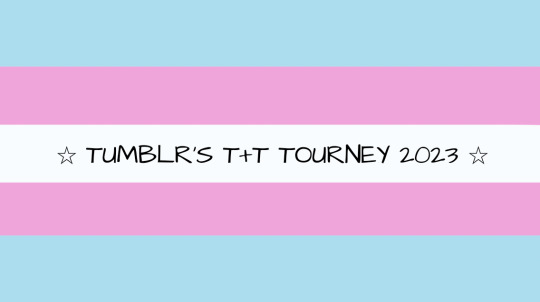

welcome one and all to the 2023 t+t tournament!! despite the long wait for the final bracket, the day has finally arrived. due to the size of the text, the list of contestants will be under the cut. due to how many contestants there are, i wont be able to tag everything, but i will tag as much as i can.
now, since it's been a while, a quick rehashing of the relevant rules!
1. be polite to others participating in the vote
2. do not Rig the vote -- propaganda is more than welcome and the askbox is always open for it! i just dont have the energy to deal with botting
3. dont be rude if the contestants youre rooting for are voted out!! sometimes thats just the way things go. theres always next time!
4. have fun !
the polls will start rolling out sometime next week. thank you!!
left:
Hexsquad (The Owl House) VS. Vault Hunters (Borderlands 1+2)
The Bad Kids (D20: Fantasy High) VS. FloweringPassionFruit (Ride the Cyclone)
Barbie + Ken (Barbie) VS. Dwarves (Deep Rock Galactic)
Mabel Pines + Dipper Pines (Gravity Falls) VS. The Fantastic 4 (Marvel)
Klaus Hargreeves + Viktor Hargreeves (The Umbrella Academy) VS. Spiderband (Spider-Man: Into/Across the Spiderverse)
Lup + Barry Bluejeans (The Adventure Zone) VS. Cleo de Nile + Deuce Gorgon (Monster High)
Spideypool (Marvel) VS. Gomez Addams + Morticia Addams (The Addams Family)
Team Rocket (Pokémon) VS. Rashmi Jamil + Amelie Macon + Loam Arnault (Entropic Float)
Link + Zelda (The Legend of Zelda) VS. Peter Parker + Harry Osborn (Marvel)
Huey Duck + B.O.Y.D. (Ducktales 2017) VS. Golf Ball + Tennis Ball (Battle for Dream Island)
Lewis + Vivi + Arthur (Mystery Skulls Animate) VS. Horokeu Usui + Pirica Usui (Shaman King)
Paulkins (Hatchetfield) VS. Magnus Chase + Alex Fierro (Magnus Chase and the Gods of Asgard)
Bill Preston + Ted Logan (Bill and Ted) VS. Leonard Church + Agent Texas (Red vs. Blue)
Ariel + Prince Eric (The Little Mermaid) VS. Polypirates (JRWI: Riptide)
Cody Goodwin + May Goodwin (It Takes Two) VS. Frank-N-Furter + Magenta + Columbia + Riff Raff (The Rocky Horror Show)
SpaceDolls (Ride the Cyclone) VS. Kim Possible + Ron Stoppable (Kim Possible)
---
right:
The Guardians of the Galaxy (Marvel) VS. Julian Bashir + Miles O'Brien + Jadzia Dax (Star Trek: Deep Space 9)
The Murder Crew (Clue) VS. The Teenage Mutant Ninja Turtles
Vash the Stampede + Nicolas D. Wolfwood + Meryl Stryfe + Milly Thompson (Trigun) VS. Team Chaotix (Sonic the Hedgehog)
Steve + Alex (Minecraft) VS. Gyro Gearloose + Lil Bulb (Ducktales 2017)
Phantom Thieves (Persona 5) VS. Wright Anything Agency + Apollo Justice + Klavier Gavin (Ace Attorney)
Westley + Buttercup (The Princess Bride) VS. Shin + Noi (Dorohedoro)
Kermit + Miss Piggy (The Muppets) VS. The Mechanisms
Jeremy Heere + Michael Mell + Christine Canigula (Be More Chill) VS. The Solve It Squad (The Solve It Squad Returns)
Harleyberts + Crockenglishes (Homestuck) VS. Sonic & co. (Sonic the Hedgehog)
Mulder + Scully (The X-Files) VS. Steph Lauter + Pete Spankoffski (Hatchetfield)
Main Cast (Omori) VS. Ben Tennyson + Gwen Tennyson + Kevin Levin (Ben 10)
Ashe Ubert + Claude Von Riegan + Sylvain Jose Gautier (Fire Emblem: Three Houses) VS. Birdetta + Yoshi (Mario)
Prime Defenders (JRWI: Prime Defenders) VS. Strilondes (Homestuck)
The Mystery Gang (Scooby Doo) VS. Billie Logan + Thea Preston (Bill and Ted)
Splatoon Idols VS. Lexthan (Hatchetfield)
Sex Bob-omb + Ramona Flowers (Scott Pilgrim vs. the World) VS. Jonathan Sims + Martin K. Blackwood (The Magnus Archives)
#tnt tourney 2023#spiderman#homestuck#the mechanisms#just roll with it#the legend of zelda#ride the cyclone#rocky horror show#sonic the hedgehog#the muppets#hatchetfield#bill and ted#dorohedoro#teenage mutant ninja turtles#marvel#the little mermaid#battle for dream island#the addams family#the princess bride#monster high#the adventure zone#barbie#fantasy high#trigun#ace attorney#ducktales#splatoon#x files#star trek#persona 5
235 notes
·
View notes
Text
I’ve been trying to bookmark the fics that I like more often so I can actually remember where to find things, but I like the idea of talking about them here more too. I’ve been blown away by the talent and creativity in this fandom and I want to shout it from the rooftops!
With that in mind, here are some Spirk fics that I’ve loved lately!
Time After Time by spaceisgay (ChancellorGriffin)
Summary:
Sam Kirk’s younger brother James is posted to the Enterprise on a six-month rotation. Spock, preoccupied with thoughts of his sister, regards this as an unique opportunity to study another pair of adult siblings in their natural habitat.
That is very much not what happens.
My thoughts: guys I feel absolutely insane about this one. It’s just so, so good. It was one of the first Spirk fics I read when I started getting into it a few months ago, and I just reread it last week because I wanted to know if it was as good as I remembered. It very much is!!!
Highlights: sibling feelings, horny mind melds, THE DINNER TABLE SCENE, dungeons and dragons.
Entering Orbit by museaway
SUMMARY:
Jim escapes to Iowa to avoid the media frenzy following the Narada incident, but a late-night miscommunication results in Spock turning up on his front porch.
My thoughts: this was great to read after watching Star Trek (2009) a few weeks ago. I don’t love the Abrams movies but there is some really spectacular fic out there for them that almost makes up for it.
Highlights: Bartender Jim and cooking for each other.
Not in Front of the Klingons by @android-and-ale
Summary: Our beloved Old Married Spirk have been sent off on yet another diplomatic mission. They’re an (in)famous presence in Federation politics, so really, everyone should know what to expect from them. If you bug their rooms you deserve what you see and hear.
Enjoy canon level “diplomacy,” the eternal mediocrity of conference centers, and lighthearted middle aged sex.
My thoughts: this is DELIGHTFUL and I adore it. Old married Spirk has become one of my favorite things to read lately and this nails it.
Highlights: the way they banter and laugh during sex. They’re so comfortable and happy together, it’s lovely.
The recitation of names by Moreta1848@jennelikejennay
Summary:
Two hundred crew members died in the attack on the USS Farragut by a sentient cloud creature. Now the ship has to limp home with traumatized survivors and a borrowed crew. Lieutenant James T. Kirk is doing the worst of anyone, but he won't admit why and doesn't want help.
One of the borrowed crew is Lieutenant Commander Spock. He feels a strange magnetism toward the troubled lieutenant, but the chain of command and his duty to the ship must always come first.
My thoughts: I haven’t been able to stop thinking about the idea of the recitation of names. It’s a beautiful way to grieve, and having Kirk and Spock do it together here is such a moving way for them to get to know each other.
Highlights: unplanned roommates, a lot of feelings about therapy/healing, just a lot of FEELINGS.
the yeomen of the garden (and laundry) by @cicaklah
Summary:
“So you and El-Tee Kirk?” Greig said as Spock came to collect his clothing again after yet another incident. “Is something going on there?”
Spock just blinks. “Which Kirk brother are you referring to?”
Greig shrugs. “I didn’t know there was more than one of them.”
Spock nods. “I am not in a relationship with Sam Kirk, if that is what you are asking.”
Greig gives him the finger-phasers. “Oh cool, cool, that's what I thought. Sweet. Tell your buddy to get better okay? His chest must be so raw after everything he’s been through to damage so many tops.”
My thoughts: this whole series has been a blast to read, but this is probably the one that has stuck in my head the most. There’s something about seeing what other people are up to on The Enterprise that hits me in the right way, and I love the laundry guy here.
Highlights: the garden, laundry workers having all the best gossip
K'diwa: A Steamy Novel of Interspecies Romance, by Jim Kirk by branwyn
Summary:
Jim wrote a romance novel just to prove he could. Then someone leaked it on the public Starfleet server, and suddenly his embarrassingly smutty and sentimental Human/Vulcan love story is all over campus. Luckily for Jim, no one knows that he’s the author. Unluckily for Jim, someone forwarded the novel to the staff of the Vulcan embassy. Now, every Vulcan in San Francisco is reassessing the logical merits of taking Human bondmates.
Spock reads a Human/Vulcan romance novel because he can hardly avoid it. Suddenly, he is consumed by the need to locate the author, ascertain their wellbeing, and instruct them in the way of Vulcan mating bonds. Luckily for Spock, it doesn't take long to identify the author as Jim Kirk. Unluckily for Spock, Jim is unconscious and surrounded by interested Vulcans who also read the book.
My thoughts: this was so fun to read! I love Jim writing a romance novel, I love how they set up all his friends at the Academy, and I love Spock falling in love with him through reading his work.
Highlights: all the Vulcan culture stuff was interesting, and I really love Gaila in this one.
#star trek#spirk#fanfic#star trek tos#ao3fic#james t kirk#spock#spirk fic#fic rec#what I’ve been reading#I’m relatively new to tumblr and don’t know the etiquette of tagging people in rec posts like this lmk if I need to change it up
90 notes
·
View notes
Note
which fandom has it the worst when it comes into missing the point of the media they consume?
I can't really think of one, because I'm struggling to determine where "missing the point" ends and "ignoring the point" begins.
Actually shit, I have a scratchpad here about that somewhere.
What is media literacy? It's your ability to comprehend a work. That's all it is. It's when a work presents a theme, and that theme actually registers with you. So an example of bad media literacy is when Star Trek fans complain about newer shows "injecting politics" into Star Trek when Star Trek was always so political it bordered on straight-up communist.
But I'd go as far as to say that even that isn't their fault, because before Deep Space Nine came out and ruined Star Trek with the plague of serialization, it was always really good at balancing those really insightful episodes with episodes where Kirk punches another green alien, or Riker's beard seduces a woman, or the Doctor learns how to daydream and fantasizes about being his own self-insert fanfiction character.
Star Trek is just as goofy as it is political. So it's possible in the reality that is broadcast TV for someone to just not see those episodes. This is also true when Deep Space Nine comes around and just has less of those episodes because it's focused on chasing the trend of serialized Science Fiction about the Space Navy.
Voyager had way more of those episodes, but Voyager was the undeserved black sheep of the franchise for a long time. So it's not even that they didn't get it, they have always applauded Star Trek doing things other than being "Fully Automatic Luxury Space Communism: The Series."
And for several entries in the franchise, it was doing that. So even the best example of bad media literacy is way more complicated than Twitter would have you believe.
Fallout is probably the second best example, as it has tons of right wing fans in spite of the fact that the franchise as a whole has always been deeply critical of American jingiositic nationalism.
And yeah that's a deep paradox right there…
Until you factor in that the most popular entries in the franchise are the ones that don't do that. When you remember that, you realize it's suddenly very easy to be a right wing, jingoistic Fallout fan. You just have to not play the games that told you to your face that you're an idiot.
Which is a whole... two of them.
To give a less politically charged example, Baldur's Gate 3 has an origin character called The Dark Urge, which is a Bhaalspawn whose story is about resisting the impulses of their tainted blood. This goes hand in hand with another character, Orin the Red, which is both a second and third generation Bhaalspawn, being the daughter and granddaughter of Sarevok (no you didn't hear that wrong).
A lot of people who play Dark Urge save it for an evil murderhobo run, but I've heard many people claim they love the idea of a good-aligned Dark Urge that resists Bhaal's taint in stark contrast to their sister.
What most people who have played this game are unaware of is that this idea is literally the entire plot of the previous games. Gorion's Ward and Imoen's conflicts with their brother Sarevok, and the rest of their siblings among the Five, and how they resist Bhaal's essence and strive to do good is the entire plot of the best series of RPGs ever made.
Yes Good-Aligned Dark Urge players, this story would be compelling. I would know, because I played it twenty years ago.
And if I were a weaker human being, I could call this Bad Media Literacy, but I know better. Most people who have played Baldur's Gate 3 flat out haven't played the older games. They might vaguely know the story, but the level to which the story is about Nature versus Nurture would fly over their heads. This is partly why I often say that Baldur's Gate 3 is a better game if you haven't played the originals, because it often steals storylines and plotlines directly from the original games wholesale and repackaged them with more preservatives and lube.
I haven't found an instance of poor media literacy that has not been able to be explained away by the simple reality of personal preference or the reality that no human being can consume every last piece of art on the planet.
Most people don't have time to see everything, and honestly it isn't a crime to be dumb. What I have seen is this technical sounding term be thrown around by fandoms angry about discourse they don't like, because the worse a work is the more adversarial and abusive the fanbase is.
In the eyes of fandom, the themes of a work are self-evident of it's quality. It's impossible to both understand a work's themes and still think it isn't good. So if someone thinks their favourite thing is bad, they must not have understood it. This is an offshoot of the way fandom treat's a trope's mere presence as quality itself regardless of execution.
Fandom is full of self-protective bullshit arguments like this.
56 notes
·
View notes
Note
AITA for asking my dad to leave the room when my mom and I watch TV together?
I recently introduced my (F16) mom (F51) to a tv show and we watch it every few nights depending on how much homework I have. Our TV is adjacent to the kitchen so whenever my dad (M46?) is on the couch or in the kitchen he can see the TV (there’s nowhere else in the house we can put it). It makes me really uncomfortable when he’s there because he’s very judgmental of the show (it’s from the early 2000s and is kinda stupid sometimes but that’s part of why I love it).
For context, it’s one of my first forays into watching TV that isn’t on the kids version of Netflix (which is all for, like, seven year olds) because my parents are really overprotective. A few months ago I asked my mom what shows she would allow me to watch because I’ve grown out of the ones she allows and she told me I can watch I Love Lucy and Star Trek. These shows don’t interest me in the least, and I pretty much gave up on watching anything for my age after that. That’s why I was so happy to find something we could watch together that she allowed, but my dad is ruining it.
I’ve asked him politely multiple times if he could leave the room while we watch it because he’s unable to not insult the show (he considers himself a media connoisseur), and even when he stays quiet for the most part, just having him looking at the screen makes me anxious about what he thinks of the show and of me for liking it. He says he owns the house and deserves to be able to go wherever he wants. I don’t want him to feel like we don’t want him around, but I haven’t set any other boundaries with him before and he keeps trampling all over this one.
The other night he came into the room while my mom and I were watching the show and I snapped that I wanted him to leave because I’ve told him before this is something for just my mom and I to do. He started talking about how nobody ever wants him around and I felt really guilty. He was about to leave when my mom called him back into the room and told me that he has every right to sit with us, that he’s promised to be quiet, and that I was being ridiculous for making it such a big deal. But for the entire rest of the show I felt really upset that he was there and that they weren’t listening to me since I’d tried to tell them I wasn’t comfortable with him watching with us about five times already and had been brushed off.
I don’t want my dad to feel excluded - he has a lot on his mind due to his work recently, and the evenings are his time to destress. But he refuses to listen to me when I try to communicate. He and my mom always tell me I have to be quiet and calm down when I start raising my voice (I never yell) and speak out against them when I feel like they’re treating me unfairly. Maybe I’m blowing this out of proportion though - it’s just watching TV. I feel dumb for making it into this big of an issue in the first place when it really shouldn’t be.
What are these acronyms?
100 notes
·
View notes
Text
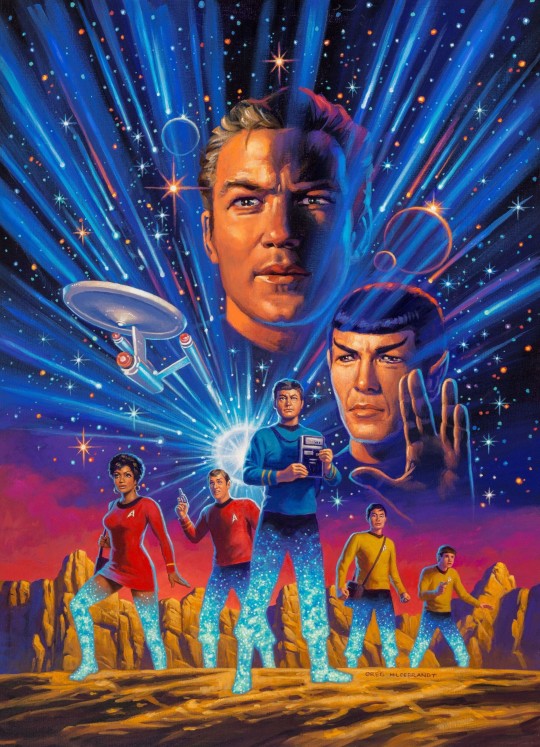
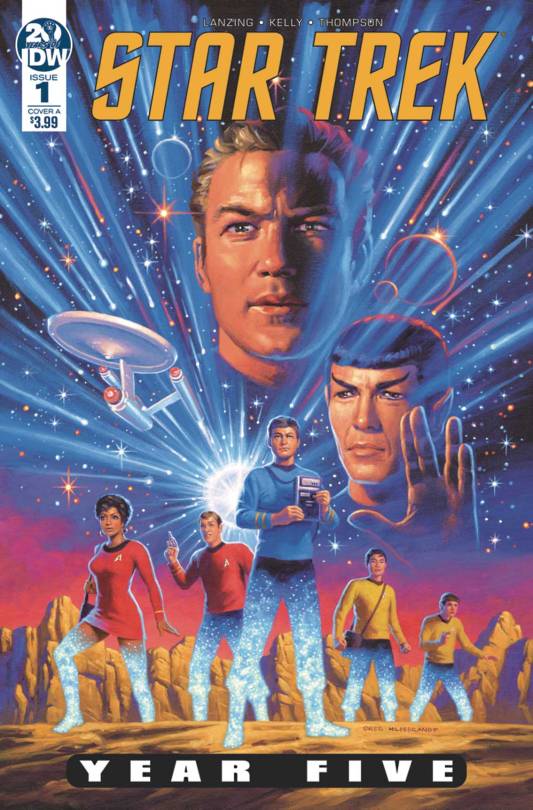
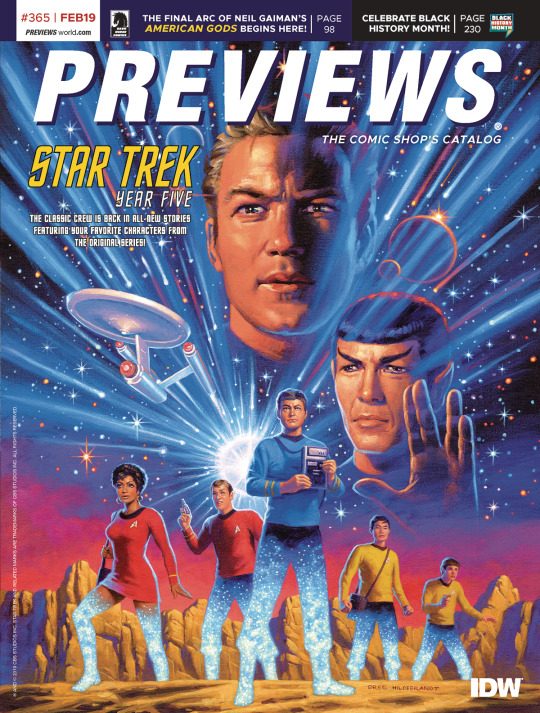
"SCIENCE FICTION HAS ALWAYS BEEN USED AS A TOOL TO COMMENT ON OUR WORLD."
PIC(S) INFO: Part 2 of 2 -- Spotlight on textless & published cover art to "STAR TREK: Year Five" Vol. 1 #1. April, 2019. IDW Publishing. Artwork by Greg Hildebrandt (reportedly Greg's first ST piece EVER, and created at a then sprightly 80 years old).
PIC #3: Cover art to "PREVIEWS" [The Comic Shop's Catalog] #365 (published February 2019), also utilizing Greg Hildebrandt's now classic "STAR TREK: Year Five" painting.
Resolution from largest to smallest: 1901x2630, 1134x1722, & 1200x1584.
Q: "How well did you know the original "STAR TREK" series? What did/do you appreciate most about it?"
GREG HILDEBRANDT: "So, when it first aired, I saw every episode. In those days, I knew it well. Today, I am not sure I could give you specific information on episodes, with the exception of a few. But as far as what I appreciate most about it is something I certainly can still remember. It was always so thoughtful as far as the story content was concerned. Science fiction has always been used as a tool to comment on our world.
Sci-fi writers disguised our world in the fantastic to make it more interesting as a vehicle to make us look at ourselves. Right off the bat, I could see that this new space opera was going to attack social, political, religious and racial issues. Which to me was art operating on its highest plain. So, I was thrilled to see it become a cult classic and go into syndication. I knew at that point it would be around to make an impact on many generations to come."
-- STAR TREK (official website)
Sources: www.previewsworld.com/Catalog/DEC180001, Major Spoilers, & Mutual Art.
#STAR TREK: Year Five#STAR TREK IDW#STAR TREK#STAR TREK Year Five IDW#STAR TREK Year Five#Science Fiction#STAR TREK TOS#The Original Series#STAR TREK: The Original Series#1960s#IDW Publishing#Greg Hildebrandt#IDW#TOS#Sci-fi#Vintage Sci-fi#Paintings#STAR TREK The Original Series#Sci-fi Fri#Original Series#Vintage Science Fiction#American Style#Sci-fi Art#Year Five#USS Enterprise#Greg Hildebrandt Art#Cover Art#STAR TREK: TOS
23 notes
·
View notes
Text
Still thinking about a Star trek TOS Firefly au. So I'm gonna have fun writing it out.
I love the dynamic between Mal, Zoe, and Wash, so that's certainly becoming the triumvirate. Mal > Jim, Zoe > Spock, Wash > Bones. However Wash's job doesn't make sense for Bones so he's going to change to doctor.
Jim was on Tarsus 4 and suffered the same as in canon, famine leads to who lives lottery and he wasn't chosen but survived anyway. I think that makes perfect sense in the Firefly universe too, but I think unlike in trek Kodos is celebrated by the federation in Firefly for making tough choices and leading in a strong way. So he's not on the run, he's a constant background side threat who's still in power. The face of the federation in this version, but not the head of it. You feel me
After Tarsus, Jim and Bones met and became mates. I think Bones moved to a big fancy planet for his wife and child after a bit. In the meant time, we have Spock!
This got massive, have a readmore
Spock is the result of eugenic experiments (there's no aliens in Firefly 😢) like the serenity thing that the og story is about (but generational eugenics not brain poking)(because I want there to be many others, just also in hiding and with their own political factions and opinions) but his resulted in Vulcan-like stuff. I think he's still got the pointy ears and has excessively strong emotions that he's learnt to hide completely cos he was raised in a medical facility by cold scientists instead of parents and love. There's schools of thought about them, some want to integrate, some want them exterminated, some want them to form their own society. The federation stance is these eugenic things don't exist and if you see one kill it because it officially doesn't exist. So Spock is forced into hiding and hasn't really had a chance to form his broader opinion, cos it's academic anyway. They're all hiding now.
So, Spock's escaped (more on that later) and in hiding. He meets Jim and they click, probably meeting in some silly battle. I reckon Spock has ways to get away from the feds that Jim wants to learn, so Jim pushes for them to team up. They spend some time together either on someone else's ship or on a smaller ship just them two.
After a while that comes to an end and they put together a crew and buy a ship together. They hire Sulu and Chekhov who are a criminal team who need to get off this rock very fast please. Chekhov can fly wonderfully and has enough engineering knowledge that they're like hey we maybe don't need someone in the engine room!
Sulu is a jack of all trades. It takes a few months for them to realise how useful he is, he always has a skill they need and always knows someone who'll play as a contact. Absolutely invaluable.
Eventually the engine breaks beyond Chekhov's skill to fix and they've all heard of Scotty. Everyone knows about Scotty. I think this would make a good episode one.
They work Sulu's contacts and find Scotty who is, lo and behold, having a drink with his mate disgraced Doctor McCoy. Spock, immediate dislike, this guy is a doctor. Jim, holy shit! Bones! Why the fuck aren't you emailing me back!?
Turns out Bones has gotten divorced and threw a bit of a fit in a hospital and can't work on a core planet anymore. He agrees to join the crew and Scotty has some issue that forms most of the episode plot and joins too cos hey, crims gotta keep moving
The ep ends with meeting Uhura, who manages a lot of the residual resistance movement's comms. She's the most political of the bunch, but Jim is absolutely in agreement and so chuffed to meet her even tho he's never been too war-y before. Scotty and Sulu already know her. She takes a kind of Inara role on the ship, but she's not companioning, she's boosted the comms in the shuttle and is continuing this work. It's great for her cos she gets to move around and be hard to catch, and it's great for the ship cos it gives them access to loads of underground people who aren't the hated federation
I also think she helped Spock break out back in the day. I'm not sure if she was part of it and they've met, or if she helped run things so she knows Spock but he doesn't know her. She's gonna be their reason for getting accidentally involved in larger things in the story and why they get more altruistic with their jobs. Spock also pulls them into some of the eugenic stuff
I reckon episode two needs some Spock eugenic stuff to happen so that Bones can solidify himself as on team Spock in action even if he has a go at Spock. Cos everyone else follows Jim's orders and Jim is team Spock, so I think Bones needs a chance to prove it. To great danger to himself ofc.
Repeat characters (like in Firefly they have Badger and Saffron who rock up as major non crew characters) are Chapel and Rand. I think Chapel is still on a core planet as a nurse. I would have her join the crew in season two, to look for her missing husband. But in season one she can be an insider informant for the hospital heist episode, which they do mainly for the medical equipment cos Bones has like nothing to treat people with. And maybe Spock has some additional medical needs that Bones needs to learn (Spock hates this)
Rand is like a bit of Saffron energy but less totally untrustworthy. I think she works them for her benefit but in a way where when they meet again they're like hey Janice you're not allowed on the ship but it's great to see you! Like, maybe she hijacks them to get her somewhere or stows away super inconveniently. Or maybe she just steals from them old school style and has a very all's fair in love and war vibe about it. She just doesn't hold any resentment, so it's hard to resent her
If I were to cast this show I'd cast Bones and Jim and women because I think it needs more women, might as well put them in positions of power, and honestly I think Spock's character with the emotional repression and all would change being cast as a woman whereas the others wouldn't. Spock's character in this is gonna be playing into stereotypes and expectation to stay in hiding, and those change as a woman
I've definitely got less tension on board than Firefly. There's no Jayne equivalent making life hard for everyone, but you could write an arc in for Chekhov like that if you wanted to. He could go from disliking the danger Spock and Uhura bring to absolutely admiring them over like two seasons. Could be interesting, but it's not got much to do with trek really
There's no shipboard romance here either. There could be something cool in the Scotty/Uhura that happened later in trek canon. Maybe they've got romantic history, so when she joins the ship there's tension and they just fall into bed together pretty quickly. But I'd only put that in if it added something else to the story, which it might! I'm not actually writing, I'm brainstorming
And similar to what the did in Firefly I think Spock/Bones makes the most sense. Cos we don't need proof that Spock and Jim understand each other, they're captain and first officer. They have each other's back absolutely. And similarly with Jim and Bones, they'd have old loyalty and friendship to draw on. And I think they also just obviously get along. But Spock and Bones could do with some plot prodding along, so I'd do something like the Simon/Kaylee romance where there's tension and clear desire but they're bad at making it happen. There's too much in the way. But it adds reason for Bones to have Spock's back (cos we're coming at at the start of their friendship, not years into their five years mission) and you can occasionally see Spock relaxing the emotional wall with someone other than Jim as he develops more serious a crush
I want to see! The Niska episode where Jim and Spock get nicked and tortured, and Bones goes in to trade for them back. He can only afford one but true to the Empath ep he just trades himself and volunteers for the torture.
I also want to see a Jaynestown style ep where Scotty or Sulu are the hero. I think probably Scotty. He'd be easy to write as selfish in a he only cares about tech kinda way and then to find that he accidentally did this would be funny. He also likes to keep a low profile generally so it's extra hilarious
Hospital heist ep, with Chapel cameo. I don't think anyone's handing Spock over to the feds, but maybe they get caught and Chekhov tries to trade Spock for their freedom? Not in a pre planned malicious, but more that he just doesn't prioritise Spock's safety over everyone else's. He sees it as a last ditch leverage effort, for the greater good. Could be good drama
Saffron style ep with Rand but she steals from them. I do think that's hilarious, showing them be the mark. And I'd let her win, leave them stranded without whatever thing it is she fleeced and having to find a new magical tech engine bit. But hey she left some booze as an apology and made out with Jim so it's not too bad
I really like Firefly
28 notes
·
View notes
Text
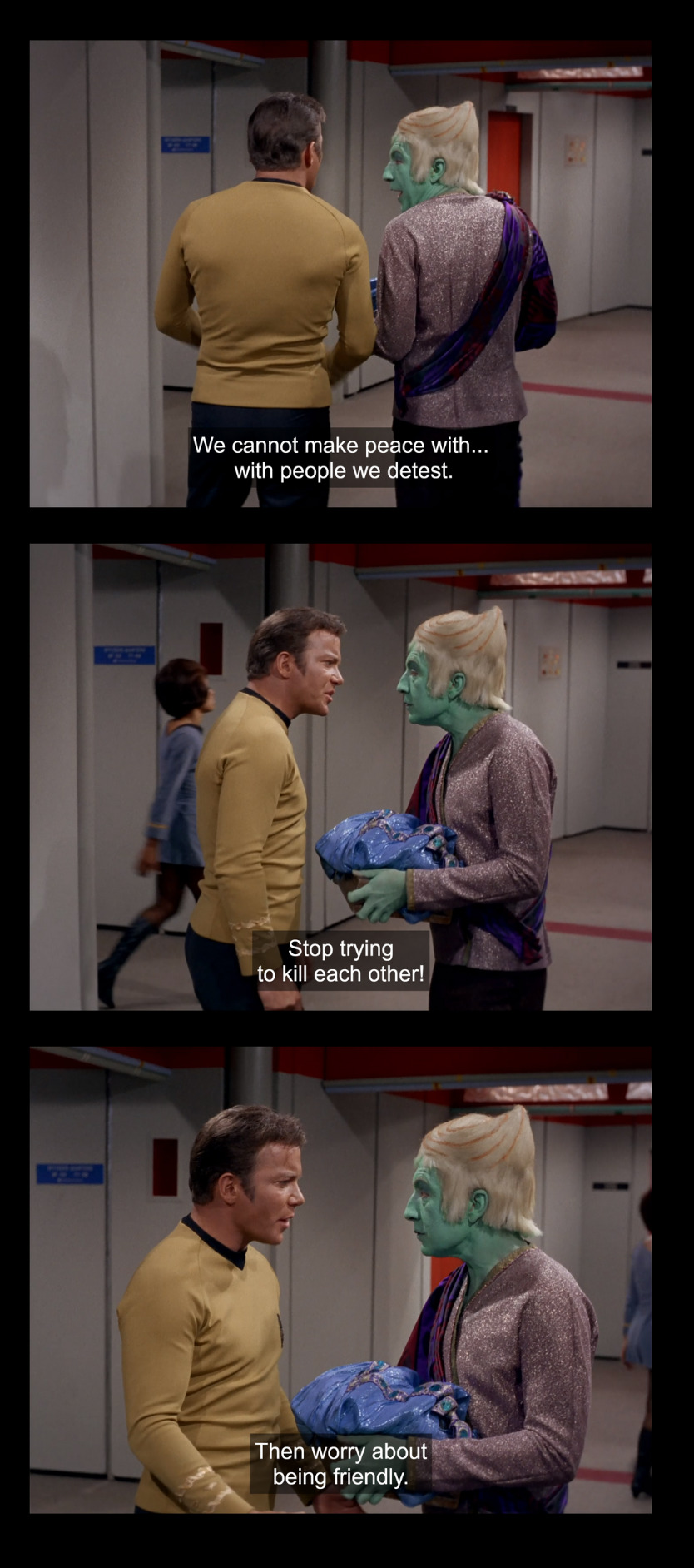
("Elaan of Troyius," 1968)
Broke: New Star Trek is Woke(TM) and Political(TM), not like TOS.
Woke: Star Trek has always been political, especially TOS.
Bespoke: James T. Kirk, Space Asshole Extraordinaire, speaking about the necessity of suppressing the universal murder impulse is the most directly politically relevant message of our time.
Stop trying to kill each other! Then worry about being friendly.
Somehow the fact that this gem is embedded in an overall episode made of 19 levels of misogyny adds something.
#star trek tos#star trek#elaan of troyius#stop trying to kill each other#kirk looks so done#if you would just stop trying to kill each other i could go back to bed
24 notes
·
View notes
Text
The original "Mirror, Mirror" episode of TOS is revealing for what it says about the priorities of the Federation and Starfleet, but the return to the Mirror Universe in STAR TREK: DEEP SPACE NINE, ENTERPRISE, and DISCOVERY is mostly indicative of the intense hypocrisy (and acute moral failings) of modern STAR TREK writers in addressing the conceptual structures in which the franchise operates.
DEEP SPACE NINE's Mirror Universe episodes are predicated on the idea that mirror-Spock did eventually succeed in reforming the Terran Empire, but it produced a worse result: The Alpha Quadrant was conquered and the former worlds of the Empire enslaved by the Klingon-Cardassian Alliance. The writers of DS9 have been explicit about how they intended this to be interpreted: According to Michael Piller, who is the credited co-writer of the script, in Ira Steven Behr's words, mirror-Spock "actually screwed things up" by bringing about "a much more gentle empire that was conquered and taken over by the Klingons, the Cardassians and others." (This is per Captains' Logs Supplemental: The Unauthorized Guide to the New Trek Voyages, as quoted in the Memory Alpha page for "Crossover.")
The idea of showing that the TOS characters were not infallible or always correct is by no means unreasonable; it's certainly true that throughout TOS, Kirk often attempts to enact dramatic, sweeping changes in other societies based on snap judgments, and it's fair to suppose that some of those decisions didn't turn out well (which is something the DC STAR TREK comic examined at several points). However, it's revealing, and dismaying, that the one DS9 chose to pursue is "Mirror, Mirror" rather than, for example, "A Taste of Armageddon," "The Apple," or "Return of the Archons." After all, what could be more emblematic of the liberal values of STAR TREK than the Kissingerian argument that fascism is justifiable where the alternative is disorder and instability? I don't hyperbolize when I say that this is the most morally indefensible position presented in DS9, although it's also sadly consistent with the franchise's political position overall.
To make matters worse, Robert Hewitt Wolfe, who contributed to the script, later asserted (in the Deep Space Nine Companion):
Empires aren't usually brutal unless there's a reason. There are usually external or internal pressures that cause them to be that way. So I just thought that if the parallel Earth was that brutal, there had to be a reason. And the reason was that the barbarians (the Klingons and the Cardassians) were at the gate.
This statement is so abhorrent I don't even know where to begin, and it makes an argument much darker than anything in "Mirror, Mirror," whose depiction of the Terran Empire is singularly horrifying, leavened only by the campy cartoonishness of its presentation.
The storyline of the ENTERPRISE Mirror Universe episodes, the two-part "In a Mirror, Darkly," is clearly shaped by Doylist (real-world) priorities — specifically, to nostalgically revisit the aesthetic of TOS — and the admittedly amusing spectacle of the regular cast playing comically evil variations of their Pollyanna-ish characters. It mercifully doesn't take Wolfe's bait about the rationale for the Empire, instead indicating that the divergence between the Prime and Mirror Universes dates back to before the events of FIRST CONTACT. However, "In a Mirror, Darkly, Part II" ends up strongly implying that the main reason the Terran Empire of Kirk's time is so similar to the Prime Universe Starfleet is that the Empire has captured (and presumably eventually reverse-engineered) a time- and dimension-displaced 23rd century Starfleet vessel, the doomed Defiant from the TOS episode "The Tholian Web." DISCOVERY muddies the waters on this point, but the ENTERPRISE episodes tend to undermine the idea that the Terran Empire is simply a different version of the Federation, instead implying that its technology and knowledge is stolen from its future "good" counterpart.
Then we have DISCOVERY's Mirror Universe episodes. Hoo boy. DISCOVERY acknowledges the ENTERPRISE storyline without really answering the questions it raises beyond indicating that knowledge of the captured Prime Universe ship is a closely guarded secret ("Vaulting Ambition"). However, DISCOVERY makes a series of extremely troubling attempts to argue that the moral failings of the Mirror Universe reflect differences in the structure of that universe (for instance, the utterly absurd assertion that the Mirror Universe is literally darker than the Prime Universe, rendering Terrans unusually photosensitive) and even the biology of its inhabitants. "Die Trying" indicates that by the 32nd century, Starfleet believes that "a chimeric strain on the subatomic level in the Terran stem cell" gives Terrans a biological inclination toward duplicity. Yikes! This is a ghastly eugenicist argument, if anything even more repellent than Wolfe's apologia for tyranny: Some people are just biologically predisposed to be evil! Thanks, I hate it!
Again, this is much worse, and much more facile, than "Mirror, Mirror." In "Mirror, Mirror," the Mirror Universe and its brutal Terran Empire serve as essentially a moral bellwether for the Federation and the familiar STAR TREK characters. Its condemnation of fascism is not deep ("the illogic of waste"), but perhaps the most valuable point it makes is that the (relative) goodness of the Federation and Starfleet is not a state of being, but rather the product of an ongoing series of moral choices. This is the other part of Kirk's argument to mirror-Spock: When mirror-Spock remarks, "One man cannot summon the future," Kirk immediately retorts, "But one man can change the present."
DISCOVERY takes the opposite position: The evils of the Mirror Universe are intrinsic and immutable, and its resemblance to the Prime Universe is largely a coincidence that is rapidly diminishing ("Terra Firma" indicates that the universes have diverged so greatly after the DS9 era that crossover will eventually become impossible). Its principal ethical or moral relevance to the Prime Universe is simply to be an obstacle and an affirmation of the Prime Universe's utopian goodness rather than an examination, even a flawed one, of it might actually mean.
#teevee#star trek#star trek tos#mirror universe#star trek ds9#deep space nine#star trek discovery#star trek enterprise#i find discovery morally objectionable in a variety of ways#and strange new worlds has been worse
44 notes
·
View notes
Text
I’ve always been a Star Wars fan over Star Trek, but let me just say that Gul Dukat is one of my favorite villains ever.

A couple years ago I watched the Star Trek movies and shows up until Enterprise, just to give the franchise a shot and see what it was really about compared to Star Wars. And out of the TV shows Deep Space Nine was my favorite.
DS9 had some political themes that I was attracted to, like the occupation of Bajor (the system that the series takes place in just after the occupation ends) by the Cardassians (Dukat’s species) and the Dominion War.
Being a high ranking official in the Cardassian army Dukat was a major part of both of these events. He was essentially in charge of the occupation, and is the one responsible for selling out his people to the Dominion. So his connection to these events is probably partly why I enjoyed his character.
But Dukat is a perfect example of being the hero of his own story. The most believable antagonists aren’t villains in their own mind. Dukat truly believes, outwardly at least, that everything he has done is good. He was on Bajor to help the Bajorans, so he says. Ignoring the suffering, the labor camps, and cultural genocide, he reiterates this belief time and time again right in the face of Bajorans that he oppressed.
Marc Alaimo portrayed the character perfectly and really brought Dukat to life. He was entertaining to watch and my little writing here doesn’t do him justice. I don’t think his ending in the show was fitting however, as he became obsessed with Bajoran legends for the entire final seasons and I think got possessed at the end? I think he should have seen the dominion war to the end and so we could see his spiral downward as his forces slowly lost. But that’s just my opinion.
Also one of my antagonists in Cozar, the main one actually, has some pretty strong inspirations from Dukat. I couldn’t help myself.

30 notes
·
View notes